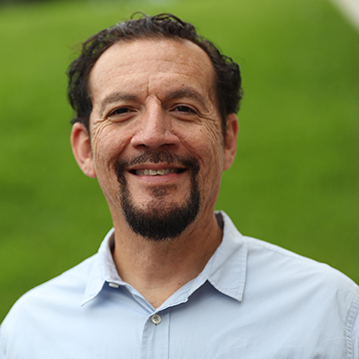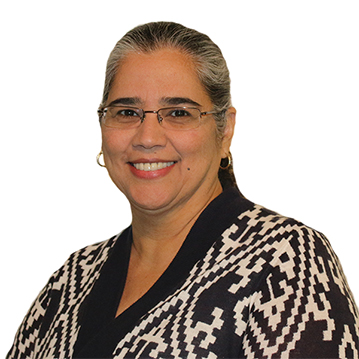Carlos Colón is a composer and liturgist, the coordinator for worship initiatives at Baylor University, and resident scholar at Baylor Institute for the Studies of Religion in Waco, Texas. Maria Monteiro is chair of the music department at Baptist University of the Americas (BUA) and music director at Primera Iglesia Bautista Mexicana in San Antonio, Texas. In this edited conversation, the two friends talk about building bridges through bilingual songs in worship.
 |
 |
| Carlos Colón | Maria Monteiro |
What is your music ministry context?
MM: I’ve taught music for 13 years at Baptist University of the Americas. Around the year 2000, we began teaching in English, not Spanish, so we could get accredited, offer bachelor’s degrees and accept students who don’t speak Spanish. We now have 300 students, and they come from 25 countries, including China and Russia. But outside the classrooms, in dorms and hallways, Spanish reigns—until someone from Korea says, “I didn’t catch that.”
I also work at First Mexican Baptist Church in San Antonio. It was founded in 1888 and is the second- oldest Protestant Mexican church in the United States. In church we sometimes have to be reminded to speak English for those who don’t understand Spanish. We also have an Anglo mission that includes worship and Sunday school in English.
CC: BUA sends students to our seminary and graduate schools here at Baylor, so I can tell you that BUA does a tremendous job. I work for the chaplain’s Office of Spiritual Life and help plan “big” chapel services. Baylor has more than 16,000 students. They are required to go to chapel for two semesters, so we get lots of 18- and 19-year-olds in chapel. They can also get chapel credits by attending alternative “small” chapels, such as morning and evening prayers.
About 20 percent of our student body is Hispanic. I’m the only Hispanic on staff in my office, so lots of Hispanic students come to me. I use some bilingual songs in our small and big chapels. Students tell me, “When we are able to sing something in our language, it’s so special” and “Oh, my mom used to sing that song to me.”
How will a new Protestant bilingual hymnal bless churches?
MM: First, it will bring resources together into one book. Right now in our church we use several books, depending on whether the service is in the sanctuary or the chapel. We have English, Spanish and bilingual hymnals and folders of coritos [little choruses].
Second, the new hymnal will match up the English and Spanish better than some translations do. Some churches like to do bilingual songs where they switch between languages for each verse. But often the verses don’t match up or they don’t tell the same story. Sometimes the English words might be best for a funeral, yet the same tune is used with Spanish words for the call to worship.
Third, the new book will be so helpful for an older Anglo piano player I know who plays Spanish-language songs but wonders what they say, or for pianists who can’t play by ear and wonder where to find the notes for popular coritos.
Given how many worship leaders choose songs from the radio and YouTube, do we still need hymnals?
CC: I see a hymnal as a depository of beauty. I’ve enjoyed working from the inside of a project like this. We are looking for songs beautiful in words, sound and doctrine. Hymnals help us to be keepers of culture for people who pay attention to what we sing and pray.
Where do you find the songs?
MM: Our team is going through the Catholic hymnal Oramos Cantando/We Pray in Song to discover which of its songs will work in a Protestant context. We’re searching other hymnals to evaluate songs translated from either language into the other. We’re comparing text versions and consulting church leaders to see which phrases might raise concerns within various Protestant traditions. We’re also looking at new compositions. Carlos Colón has translated and arranged some of the songs we are considering. We’re working with GIA Publications and Calvin Institute of Christian Worship on this project, but there is no timeline yet for when the hymnal will be ready.
What are some unique blessings or challenges of singing bilingually?
MM: BUA is an international school, and we have one choir, open to everyone—even if you don’t know how to read music or are still learning English. Many students have never had the chance to sing in a choir, and they love it. I’m from Brazil, so I grew up speaking Portuguese. Singing in another language—whether Chinese, French, Hebrew or Latin—gives a feeling of discovery. We learn so much from each other about how to praise God.
One of the trickiest things for our choir was learning to sing the favorite Christmas song of a student from Hungary. The Hungarian student sent a recording back home, and people there were amazed to hear our choir singing that carol. It was an example of how music can welcome students and make them feel not invisible.
CC: My idea is that singing bilingually has always been part of the church. The early Christians probably sang in Greek and Hebrew. But it can be challenging. I collaborate with a Baptist pastor in a multicultural church where the early service is in Spanish. Most people there are undocumented and welcome this island of “Spanish only.” I don’t know how open they would be to bilingual music. You have to use pastoral discretion.
Besides compiling a new bilingual hymnal, what else do we need to encourage bilingual singing?
CC: We will also need to do recordings, chord sheets and YouTube videos. In my head, I’m already hearing a choral version of “Divino Compañero.” It’s also important to share the stories behind the songs because we are people of stories. I recently learned that Antonio Rivera wrote “Divino compañero del camino” (“Divine Companion of the Journey”) after his dad died alone at the back of the bus on a trip. It comforted Rivera to think that his dad knew God was with him as his journey ended. The words are pregnant with story and meaning, like para posar [abide with me] makes us think of posadas [re-enactments of Mary and Joseph’s search for lodging]. Think about singing this with people who have gone through the perils of Mexico to get into the U.S.
MM: Carlos, I want to sing this song and share its story in my church. There’s also a story about “Recibirás Bendición,” a blessing song based on Deuteronomy 28:6. It was written in Portuguese. Argentinian Gerardo Oberman translated it to Spanish. It’s one of our BUA heart songs, and we sing it at graduation. In English, the song asks the Lord to “bless the fruit of your life, the fruit of your land.” Singing it reminds us that we are all one and all in this work together.
What do you hope to see 10 years from now in how singing bilingually can build bridges?
MM: When I first came to BUA in 2003, I taught theology. People wondered whether we needed a music program. It took 12 years for us to offer a B.A. in music. Many BUA students never had a chance to study music theory and history or to learn to read music or to play piano. In this hymnal we will use songs from different contexts and present wonderful new things. We’ll discover nurturing and nourishing music that will bless our students and the congregations they serve.
CC: Hymns from the Reformation became inspirations for J.S. Bach. I like to dream that future Latin American composers can do better with sacred music. Maybe they can collaborate with churches where people can read music.
And I hope we learn to take time to internalize these words and musical prayers. My wife is an Orthodox Christian, and we pray together each night at home. I’m already being affected by praying and singing "O Gladsome Light," a third-century hymn text I learned at her parish, and I am setting it to music for our new hymnal. When I rush to check my email one last time before going to bed, I find myself thinking, “Wait. I just prayed, ‘Now that we have come to the setting of the sun . . .’." This ancient hymn is forming me to understand that each night is a blessing given to us, a mini-Sabbath.
How does this bilingual hymnal project relate to the 500th anniversary of the Protestant Reformation?
MM: The new book Our 95 Theses: 500 Years after the Reformation has a chapter by Nora O. Lozano, head of BUA’s theology department. She writes about what Baptists think about the Protestant Reformation. Some say, “We have existed since John the Baptist, so we have nothing to do with the Reformation.” Others think it’s just about Luther protesting against excesses. But one Reformation legacy in the Baptist tradition is that we celebrate the importance of singing together in worship.
CC: Some Baptists have this narrative that we’re not really Protestants. But we share a lot with the Reformation’s deep respect and passion for reading Scripture. My mom grew up in a little village in El Salvador where people were forbidden to read Scripture on their own. My mom was an agnostic hippie. But she saw I was deeply spiritual, so she found a nun to smuggle out a copy of the Bible—and my mom would read psalms with me every night. Singing psalms and Scripture-based songs bilingually is a way for us to reflect on and rededicate ourselves to the good parts of the Reformation.
LEARN MORE
Register for the 2017 Calvin Symposium on Worship so you can hear Carlos Colón speak on bilingual music and lead music in a bilingual vespers service. Read an old but still useful Reformed Worship story by C. Michael Hawn on Hispanic worship songs around the world.

